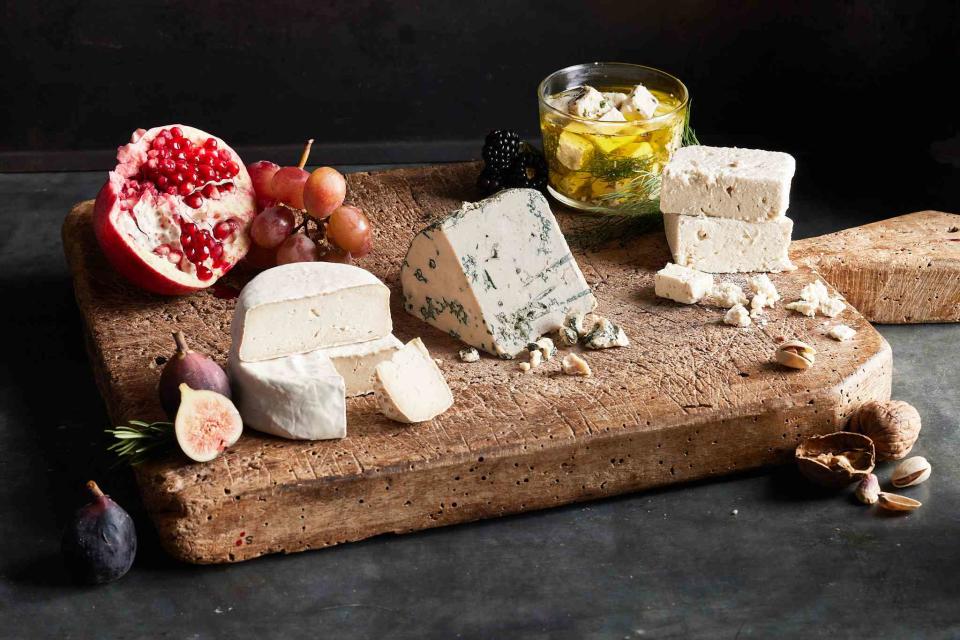Plant-Based Cheese Wins (Then Loses) Prestigious Dairy Competition
This award ceremony really stinks.

Climax Foods
When the Good Food Foundation announced in late January that the Berkeley, California-based Climax Foods’ plant-based blue cheese had won its category in the prestigious Good Food Awards competition, the team that created the cheese immediately booked flights to the foundation’s April 29 awards event in Portland, Oregon. For them, it was the equivalent of the Oscars.
Their win was an underdog triumph and a strike for plant-based products. Their blue, or “bleu,” based on cashews and made to grow its own tangy mold, had competed against artisanal dairy-made cheeses and had come out on top. No other plant-based entrants were in the competition.
Related: How the 'Queen of Vegan Cheese' Uses Old-School Cheesemaking Techniques
On April 22, a week before the awards ceremony, the other shoe dropped: Climax was coolly notified via email that their entry had been disqualified and their victory annulled because it contained kokum butter (which it did not) and because it was not “retail ready” — food industry parlance for meeting GRAS, or “generally regarded as safe” standards.
Climax’s blue is already marketed to many top-end restaurants — including the much-acclaimed and completely vegan Eleven Madison Park in New York City — and will be retailed shortly. Climax is partnering with the Bel group, producers of Boursin and Baby Bel cheeses, for a variety of products. Rather than kokum butter, Climax Foods' blue cheese contains cocoa butter, which is common and which the makers chose precisely because it does meet GRAS standards.
Immediately after the disqualification, a backlash against the Good Food Foundation sprang to life among foodtech stakeholders, academics, researchers, and vegan advocates. At issue were the whys and wherefores of the disqualification’s suspicious, vertiginous timing.
Related: How to Build a Beautiful Vegan Cheese Board
There were a couple of new-ish “requirements” for award applicants on the Foundation’s website that turned out to have been added retrospectively, which is to say, after the 2023 application process for the 2024 awards. In a word, the competition’s goalposts seemed to have been moved.
But the disqualification has roots more tangled than that. As far back as the announcement that the Good Food Foundation would accept plant-based applicants in the 2024 competition, it came under sustained artillery fire from ranks of dairy-based cheesemakers for even considering an application from a foodtech company.
To quell that conflagration among its core entrants, the foundation issued a statement saying that they’d separate the categories in future years and that, in the case of a 2024 foodtech winner, a dairy winner would also be selected.
The founder and CEO of Climax, Dr. Oliver Zahn, is a former astrophysicist and a fair sleuth. In the aftermath, Dr. Zahn noted that the Foundation’s disqualification of his team’s cheese was undertaken “in direct response to a dairy industry person that contacted (the Good Food Foundation) this month to come up with a way to disqualify us.”
Related: Vegan Pimiento Cheese
It remains unclear why the foundation chose to backtrack on its vow to the dairy lobby to select a dairy winner if the Climax entry won, rather than killing the Climax application and retracting its win. But perhaps the greatest irony is that Climax is, already, partnered with a globally-renowned dairy.
Bottom line? The saga seems to beg Hollywood for a rollicking satire starring Vince Vaughn and Owen Wilson as foodtech startup dudes on the make.
For more Food & Wine news, make sure to sign up for our newsletter!
Read the original article on Food & Wine.


